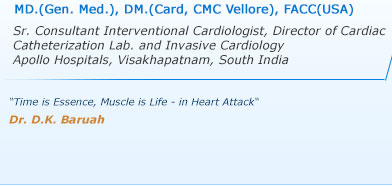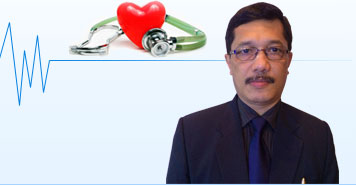Cerebrovascular disease
Cerebrovascular disease is a condition in which the arteries leading the to the brain become obstructed, which can decrease blood supply to the brain. A stroke occurs when one of these arteries becomes completely blocked, cutting off the blood supply to all or part of the brain. This can result in significant brain damage, depending on the size of the obstructed artery and the duration of the blockage.
Hypertensive heart disease
Hypertension, also known as high blood pressure, can increase the risk for a number of other heart-related conditions, including heart attack, stroke, cardiac arrest, and congestive heart failure.
| |
What causes cardiac disease? |
Prevalence of cardiac disease in the U.S., by age group
Number of U.S. deaths due to cardiac disease, from 1900-2004Most cardiac diseases are caused by the buildup of cholesterol and other lipids in the walls of blood vessels, which can cause them to constrict or reduce their ability to expand and contract in response to changing demand for blood circulation. This buildup can even cause blockages in the arteries, blocking the blood supply to a certain part of the body. Additionally, some factors can increase blood pressure or elevate the heart rate, which can increase the risk of developing cardiac disease. The combination of the two factors, arterial buildup and high blood pressure, can greatly increase the likelihood of heart problems. Many factors can contribute to a higher risk of heart disease, including:
|
|
Tobacco smoking |
|
|
High cholesterol levels |
|
|
Obesity |
|
|
Physical inactivity |
|
|
Diets high in fat, salt, or refined carbohydrates |
Elevated heart rate - can be caused by overuse of stimulants
These risk factors are generally preventable, though there are some risk factors that cannot be prevented. Genetics have been linked to cardiovascular disease; some people with a family history of heart problems are naturally more predisposed to develop cardiac problems themselves. In addition to the hereditary aspect, males are more likely than females to suffer from cardiac diseases. Old age is also a risk factor. The risk of heart attack, stroke, and cardiac arrest increases with age, and over half of all people over the age of 60 suffer from some form of cardiac disease.
The treatment of cardiac disease is divided into two categories: preventive treatment and the treatment of existing conditions. The risk factors for cardiac disease are well-known, and much of the preventive treatment involves lifestyle changes aimed at decreasing a person's risk of developing problems later on. Common recommendations for preventing heart disease include avoiding smoking, eating a generally healthier diet, and getting regular aerobic exercise, among other things. When the lifestyle changes aren't sufficient, there are a wide range of pharmaceuticals available to lower blood cholesterol levels and decrease blood pressure, which are both risk factors for cardiac disease. Antihypertensives, which lower blood pressure, and statins, which lower cholesterol, have become widely used to decrease the risk of developing heart problems.
The treatment of existing cardiac diseases includes both surgical and drug therapies. Angioplasty is a commonly used procedure that physically widens constricted or blocked arteries. In more severe cases, coronary bypass surgery replaces damaged blood vessels with healthier ones. This surgery is used to repair the critical coronary arteries, which supply blood to the heart muscle itself and, if damaged, can lead to heart attacks. In addition to surgical procedures, drugs are also commonly used to treat existing heart conditions. Specifically, drugs aimed at lowering blood pressure and preventing the aggregation of platelets in the bloodstream are the most widely used. These don't specifically work to repair damaged vessels or heart tissue, but they do help to prevent the recurrence of acute cardiac problems like strokes and heart attacks. As with preventive therapies, abstinence from known risk factors is key to the treatment of cardiac diseases. |





